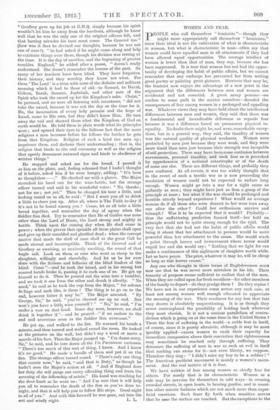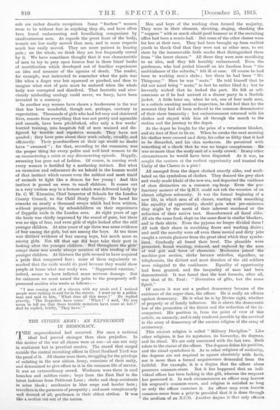WOMEN AND FEAR.
PEOPLE who call themselves " feminists "—though they might more appropriately call themselves " hominists," since their ideal is not the cultivation of what is characteristics in woman, but what is characteristic in man—often say that women could have equalled man in all attainments if they had been allowed equal opportunities. The average intellect of woman is lower than that of man, they say, because she has been suppressed. It is true that woman has not had the oppor- tunity of developing the habit of public affairs, but we cannot remember that any embargo has prevented her from writing great poetry or painting great pictures. However that may be, the feminist now enjoys the advantage of a new point in the argument that the differences between men and women are accidental and not essential. A great many persons—we confess to some guilt in the matter ourselves—dreaded the consequences of fear among women in a prolonged and appalling war. Whatever views they may have held about the intellectual differences between men and women, they said that there was a fundamental and ineradicable differenoe as regards fear because it was a difference based on permanent physical in. equality. No doubt there might be, and were, remarkable excep - tions, but in a general way, they said, the timidity of women was the natural quality of physical weakness. Women were protected by men just because they were weak, and they were more timid than men just because their strength was incapable of self-protection. There may have been some confusion between nervousness, personal timidity, and such fear as is provoked by apprehension of a national catastrophe or of the death of some one else. These are different things, and probably they were confused. At all events, it was too widely thought that in the event of such a terrific war as is now proceeding the resolution of women could not be expected to endure long enough. Women might go into a war for a right cause as gallantly as men ; they might have just as firm a grasp of the principle at issue ; but what if the war should be prolonged and horrible utterly beyond experience ? What would an average woman do if all those who were dearest to her were torn away one after the other ? Could her enthusiasm survive and triumph ? Was it to be expected that it would ? Probably-- thus the unflattering prediction framed itself—her hold on principle would not be quite strong enough for the trial. The very fact that she had not the habit of public affairs would bring it about that her attachment to persons would be more powerful than her attachment to the cause. She would reach a point through horror and bereavement where terror would engulf her and she would cry: " Nothing that we fight for can make a continuance of this nightmare of slaughter worth while. Let us have peace. The price, whatever it may be, will be cheap so long as this horror ceases."
Any one who thought in those terms of Englishwomen must now see that he was never more mistaken in his life. Their tenacity of purpose seems sufficient to outlast that of the men. When they are called upon for fresh sacrifices—for other members of the family to depart—do they grudge thorn t Do they repine 7 We have not in our experience come across any such case, at least not among women well enough educated to appreciate the meaning of the war. Their readiness for any loss that fate may decree is absolutely unquestioning. It is as though they never contemplated the possibility of holding back whatever they most cherish. Is it not a curious parallelism of contra- diction which is going on at the same time in the United States ? There the fear of suffering in the world—a noble fear in itself, of course, since it is purely altruistic, although it may be most ignobly applied—causes women to exalt their capacity for immediate compassion above their conviction that righteousness may sometimes be reached only through suffering. They denounce the suffering of men in war as such an evil in itself that nothing can atone for it—not even liberty, we suppose. Therefore they sing : " I didn't raise my boy to be a soldier " Tho American pacificist movement is mainly a women's move• meat. And the real motive of it is fear.
Wo have written of fear among women as chiefly fear for others. For surely that is its characteristic. Women as rule may be nervous for themselves in odd ways—in crossing crowded streets, in open boats, in hearing gunfire, and in count- less other minute fashions which are not much more than super. ficial emotions. Such fears fly forth when sensitive nerves that lie near the surface aro touched, But the exceptions to the rule are rather drastic exceptions. Some " fearless " women seem to be without fear in anything they do, and have often been found embarrassing and humiliating companions by unadventurous men. As regards the great fears of the body, women are less easily moved than men, and in some respects much less easily moved. They are more patient in bearing pain ; on the whole, we think they are less frequently cowed by it. We have sometimes thought that it was characteristic of men to try to prey upon human fear in those friars' books of mortification which developed out of familiar experiences an idea and measure of the agonies of death. The reader, for example, was instructed to remember what the pain was like when a finger was but squeezed or pinched, and then to imagine what sort of pain must be endured when the whole body was corrupted and dissolved. That fantastic and atro- ciously misleading analogy could never, we fancy, have been invented in a nunnery.
In another way women have shown a fearlessness in the war that has been wonderful, though not, perhaps, contrary to expectation. Thousands of girls who had led easy and cloistered lives, remote from everything that was not pretty and agreeable and smooth, have been pitohforked, after only a few weeks' hurried training, into hospitals full of men maimed and dis- figured by terrible and repulsive wounds. They have not quailed ; they have gone about their work calmly, steadily, and efficiently. Their grandmothers at their age would no doubt have " swooned " ; for that, according to the romances, was the proper thing for every polite and well-bred woman to do on encountering a crisis or any disconcerting episode. Happily, swooning has gone out of fashion. Of course, in nursing work every woman is fortified by a mothering instinct. But what an extension and refinement do we behold in the human world
of that instinct which causes even the mildest and most timid of animals to fight like a demon for her young ! And this instinct is passed on even to small children. It comes out in a very curious way in a lecture which was delivered lately by Dr. C. W. Kimmins, Chief Inspector of Schools for the London
County Council, to the Child Study Society. He based his remarks on nearly a thousand essays which had been written, without preparation, by schoolchildren on their experiences of Zeppelin raids in the London area. At eight years of age the brain was chiefly impressed by the sound of guns, but there was no sign of fear, and even girls of eight looked after the still younger children. At nine years of age there was some evidence of fear among the girls, but not among the boys. At ten there was distinct evidence of fear among boys, but much more so among girls. Not till that age did boys take their part in looking after the younger children. But throughout the girls' essays there was nearly always mention of this tending of the younger children. At thirteen the girls seemed to have acquired a pride that conquered fear ; some of them sagaciously re- marked that the raids would do good because they would show people at home what war really was. " Suppressed emotion," indeed, seems to have inflicted some nervous damage. But for calmness we must award the palm to the pompously self- possessed maiden who wrote as follows :-
" I was coming out of a cinema with my uncle and I noticed people were rushing to and fro in the streets. I went up to a police- man and said to him, ` What does all this mean ? ' He replied gravely, ' The Zeppelins have come.' What ? ' I said, 'Do you mean to tell me that those terrible monsters have come at last ? ' And ho replied, briefly, ` They have.' "



































 Previous page
Previous page